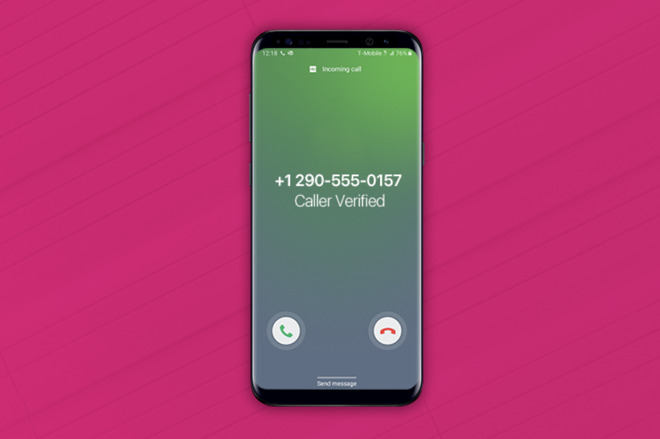T-Mobile and AT&T partner to battle robocalls
AT&T and T-Mobile have announced a new partnership designed to thwart robocalls by authenticating incoming calls across both networks.

T-Mobile call authentication
Based on SHAKEN/STIR standards, the cross-network call authentication feature went live on Wednesday, with customers on T-Mobile or Metro by T-Mobile seeing incoming calls from AT&T customers labeled as "Caller Verified." The same goes for AT&T devices receiving a call from a user on T-Mobile's network.
To date, this verification feature is supported by a dozen Samsung and LG devices, with more to come. Currently, iPhones don't support the feature.
It is important to note that while authentication informs users who is actually calling, it does nothing to actually reduce or block the number of spoofed calls. Further, the feature is not yet compatible with other networks, meaning a call from a Verizon customer will appear identical to a robocall.
The new partnership is a first step in the carriers' plans to cut back on robocalls as recommended by the FCC. The FCC has called on carriers to implement SHAKEN/STIR standards so users know that an incoming call is actually from the number that appears onscreen.
T-Mobile was the first major carrier to implement the SHAKEN/STIR standards, offering support for its own customers since the beginning of 2019. It later rolled out integration with Xfinity land lines in April.
The FCC just passed new rules of its own that help battle foreign robocalls in an extension of the Truth in Caller ID act of 2009, which enables the body to prohibit spoofing in text messages, foreign robocalls and "additional types of voice calls" including one-way VoIP calls.

T-Mobile call authentication
Based on SHAKEN/STIR standards, the cross-network call authentication feature went live on Wednesday, with customers on T-Mobile or Metro by T-Mobile seeing incoming calls from AT&T customers labeled as "Caller Verified." The same goes for AT&T devices receiving a call from a user on T-Mobile's network.
To date, this verification feature is supported by a dozen Samsung and LG devices, with more to come. Currently, iPhones don't support the feature.
It is important to note that while authentication informs users who is actually calling, it does nothing to actually reduce or block the number of spoofed calls. Further, the feature is not yet compatible with other networks, meaning a call from a Verizon customer will appear identical to a robocall.
The new partnership is a first step in the carriers' plans to cut back on robocalls as recommended by the FCC. The FCC has called on carriers to implement SHAKEN/STIR standards so users know that an incoming call is actually from the number that appears onscreen.
T-Mobile was the first major carrier to implement the SHAKEN/STIR standards, offering support for its own customers since the beginning of 2019. It later rolled out integration with Xfinity land lines in April.
The FCC just passed new rules of its own that help battle foreign robocalls in an extension of the Truth in Caller ID act of 2009, which enables the body to prohibit spoofing in text messages, foreign robocalls and "additional types of voice calls" including one-way VoIP calls.

Comments
”Currently, iPhones don't support the feature.”
But, regardless, I welcome this new screening tool.
I would also welcome an iOS enhancement that differentiates calls from a number in my contact list from those that aren't -- with an option to either silence the call, give it a different ring tone, forward the call to my landline, or send it to voice mail. That doesn't seem like it would be hard to do.
“Silence unknown callers
A new setting protects users from unknown and spam callers. When the setting is turned on, iOS uses Siri intelligence to allow calls to ring your phone from numbers in Contacts, Mail, and Messages. All other calls are automatically sent to voicemail.”
The fun part will be parsing legitimate calls from HR departments during a job search. A lot of such people these days call from a mobile number with only a name and no company ID. If I don't recognize the name/number I let it roll to voicemail. This is really not a tactic I like; I want to answer a recruiter on the spot.
My home phone was the first to get robo-foreign-languare calls...
Not to mention the dozens of senior citizen-aimed telemarketer calls that come through everyday.
And the Amazon support "suspicious activity" phone phishing calls.
I still swear the Do Not Call list simply provided them with a list of known numbers...
If it is a working telephone number, they will get through.